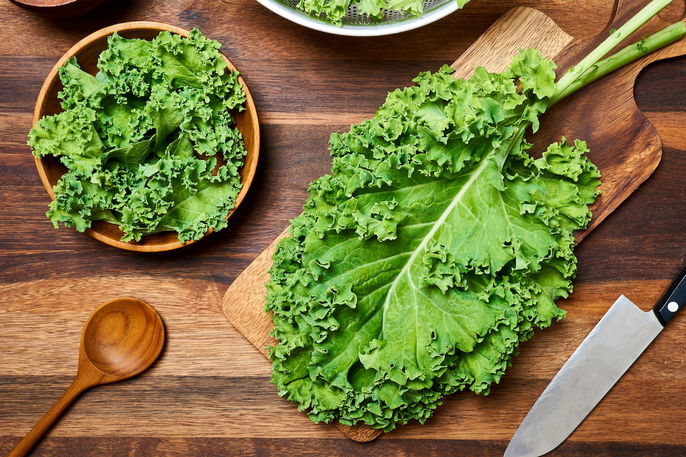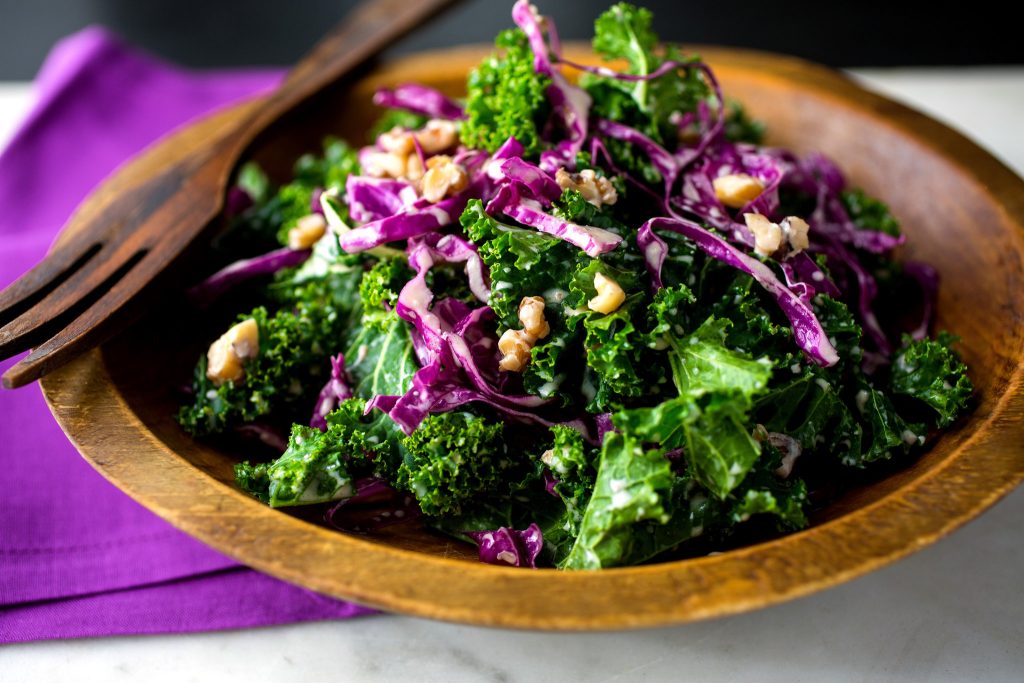Kale has emerged as one of the most popular superfoods in recent years, often touted for its myriad health benefits and impressive nutritional profile. As a member of the Brassica family, which includes other nutrient-rich vegetables like broccoli, cabbage, and Brussels sprouts, kale is not only versatile in culinary applications but also a powerhouse of vitamins, minerals, and antioxidants. This comprehensive guide will explore the benefits of kale, examining its nutritional content, health advantages, and practical tips for incorporating this leafy green into your diet.
Nutritional Profile of Kale

Kale is often celebrated for its nutrient density, meaning it provides a high amount of essential nutrients relative to its calorie content. Here’s a detailed breakdown of its key nutritional components:
Vitamins
- Vitamin K: Kale is exceptionally high in vitamin K, which is crucial for blood clotting and bone health. Just one cup of cooked kale can provide over 1,000% of the recommended daily intake. This vitamin helps to activate proteins that are essential for blood coagulation and also plays a role in maintaining bone density.
- Vitamin A: This vitamin is vital for maintaining healthy vision, skin, and immune function. Kale contains beta-carotene, which the body converts into vitamin A, making it a great source of this essential nutrient.
- Vitamin C: Known for its antioxidant properties, vitamin C supports the immune system, promotes skin health, and aids in the absorption of iron from plant-based foods. Kale provides a significant amount of vitamin C, contributing to overall health.
- B Vitamins: Kale is rich in several B vitamins, including B6 (pyridoxine), folate, and riboflavin. These vitamins are essential for energy metabolism, brain function, and the production of red blood cells.
Minerals
- Calcium: While dairy products are often considered the primary source of calcium, kale is an excellent plant-based alternative. Calcium is essential for bone health, muscle function, and nerve signaling.
- Potassium: Kale is a good source of potassium, which helps regulate blood pressure and fluid balance in the body. Adequate potassium intake is associated with a reduced risk of stroke and heart disease.
- Magnesium: This mineral is involved in over 300 biochemical reactions in the body, including energy production, muscle contraction, and nerve function. Kale provides a healthy dose of magnesium, contributing to overall health.
Fiber
Kale is high in dietary fiber, which is essential for digestive health. Fiber promotes regular bowel movements, helps control blood sugar levels, and contributes to feelings of fullness, making it beneficial for weight management.
Antioxidants
Kale contains several powerful antioxidants, including quercetin and kaempferol. These compounds help combat oxidative stress and inflammation in the body, reducing the risk of chronic diseases.
Health Benefits of Kale
:max_bytes(150000):strip_icc()/Kale-8f81aacdba7a4209b68692758e234a28.jpg)
1. Nutrient Density
One of the most significant benefits of kale is its nutrient density. It provides a wealth of vitamins and minerals while being low in calories. This makes it an excellent choice for individuals looking to improve their overall nutrition without consuming excess calories. Including nutrient-dense foods like kale in your diet can help ensure you meet your daily nutritional needs.
2. Heart Health
Kale supports heart health through its high levels of fiber, potassium, and antioxidants. Regular consumption of kale can help lower cholesterol levels, reduce blood pressure, and decrease the risk of cardiovascular diseases. The fiber in kale binds to bile acids in the digestive system, which can help lower LDL (bad) cholesterol levels. Additionally, the potassium in kale helps maintain healthy blood pressure by balancing sodium levels in the body.
3. Anti-Inflammatory Properties
Chronic inflammation is linked to numerous health issues, including heart disease, diabetes, and cancer. Kale contains various compounds that have anti-inflammatory effects, helping to reduce inflammation in the body. The antioxidants found in kale, such as quercetin and kaempferol, play a crucial role in combating oxidative stress and inflammation, making kale a valuable addition to an anti-inflammatory diet.
4. Bone Health
With its high levels of vitamin K and calcium, kale promotes bone health. Vitamin K is essential for calcium absorption and bone mineralization, which helps reduce the risk of fractures and osteoporosis. Incorporating kale into your diet can support bone density and overall skeletal health, especially in older adults who are at a higher risk for bone-related issues.
5. Weight Management
Another significant benefit of kale is its ability to aid in weight management. Low in calories but high in fiber, kale promotes satiety, helping you feel full longer and reducing overall calorie consumption. Including kale in meals can help control appetite and prevent overeating, making it an excellent choice for those looking to maintain or lose weight.
6. Eye Health
Kale is rich in lutein and zeaxanthin, antioxidants that are beneficial for eye health. These compounds help protect against age-related macular degeneration and cataracts, two common eye conditions associated with aging. Consuming kale regularly can contribute to better eye health and help maintain good vision as you age.
7. Improved Digestion
The high fiber content in kale supports healthy digestion. Fiber promotes regular bowel movements, prevents constipation, and supports a healthy gut microbiome. A healthy digestive system is essential for overall well-being, as it aids in nutrient absorption and helps prevent digestive disorders.
8. Cancer Prevention
Some studies suggest that the compounds found in kale may have cancer-fighting properties. The glucosinolates in kale are thought to play a role in detoxifying potential carcinogens and reducing the risk of certain cancers, particularly colorectal cancer. While more research is needed, incorporating kale into a balanced diet may contribute to cancer prevention efforts.
How to Incorporate Kale into Your Diet
To fully enjoy the benefits of kale, it’s essential to include it in your meals. Here are some practical tips and popular ways to enjoy kale for your knowledge:
1. Salads
Fresh kale makes an excellent base for salads. To enhance the flavor and texture, massage the leaves with olive oil and lemon juice. This process helps to soften the leaves and reduce bitterness. You can add a variety of toppings, such as nuts, seeds, fruits, and proteins, to create a nutrient-packed meal.
2. Smoothies
Blending kale into smoothies is a fantastic way to boost your nutrient intake. Combine kale with fruits like bananas, berries, and yogurt for a delicious and healthy drink. The sweetness of the fruits can help mask the slightly bitter taste of kale, making it more palatable.
3. Soups and Stews
Incorporate chopped kale into soups and stews for added nutrition and flavor. Kale pairs well with beans, lentils, and other vegetables, making it a great addition to hearty dishes. Cooking kale in soups can also help soften its texture, making it easier to eat.
4. Sautéed or Stir-Fried
Sautéing kale with garlic and olive oil is a quick and healthy way to prepare this leafy green. You can also stir-fry kale with other vegetables and proteins for a complete meal. Adding kale to stir-fries not only enhances the nutritional value but also adds a vibrant color to your dish.
5. Kale Chips
Make a healthy snack by baking kale leaves with a drizzle of olive oil and your favorite seasonings until crispy. Kale chips are a nutritious alternative to traditional potato chips and can be enjoyed as a snack or a crunchy topping for salads.
6. Pesto
Blend kale into pesto for a nutritious twist on this classic sauce. Combine kale with garlic, nuts (such as pine nuts or walnuts), olive oil, and Parmesan cheese for a flavorful sauce that can be used on pasta, sandwiches, or as a dip.
7. Omelets and Frittatas
Add chopped kale to omelets or frittatas for a nutritious breakfast option. The eggs provide protein, while the kale adds vitamins and minerals, making for a balanced meal to start your day.
Conclusion
The benefits of kale are numerous, making it a fantastic addition to a healthy diet. Its rich nutritional profile, combined with its versatility in the kitchen, allows you to enjoy its health advantages in various ways. From supporting heart health and bone density to aiding in weight management and promoting eye health, kale is a powerhouse of nutrition.
By incorporating kale into your meals—whether in salads, smoothies, soups, or as a snack—you can significantly enhance your overall health. Embrace this superfood and discover the positive impact it can have on your wellness journey. Whether you’re a seasoned kale lover or new to this leafy green, there are endless ways to enjoy its benefits and improve your health one bite at a time.
Read Also About Knowledge acquisition is the process by which individuals gain new information, skills, or understanding. It involves learning through various methods, including reading, observation, experience, and instruction.

